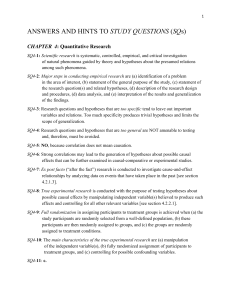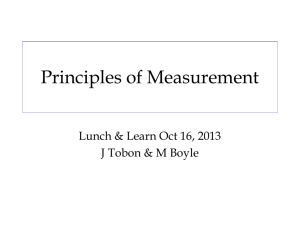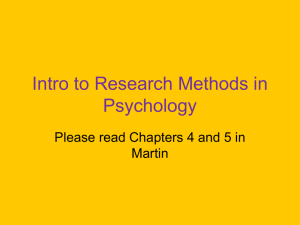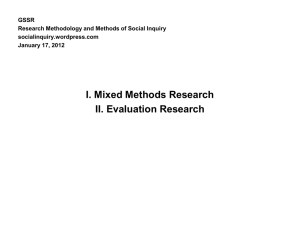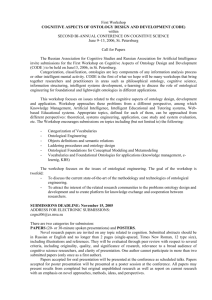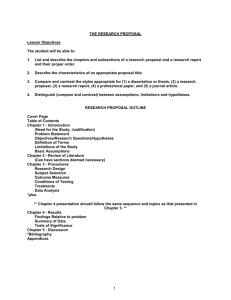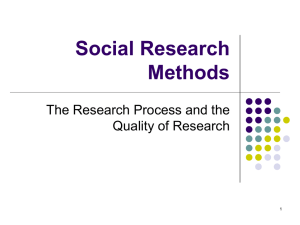The Methodology Section - Humanities Office of Research and
advertisement
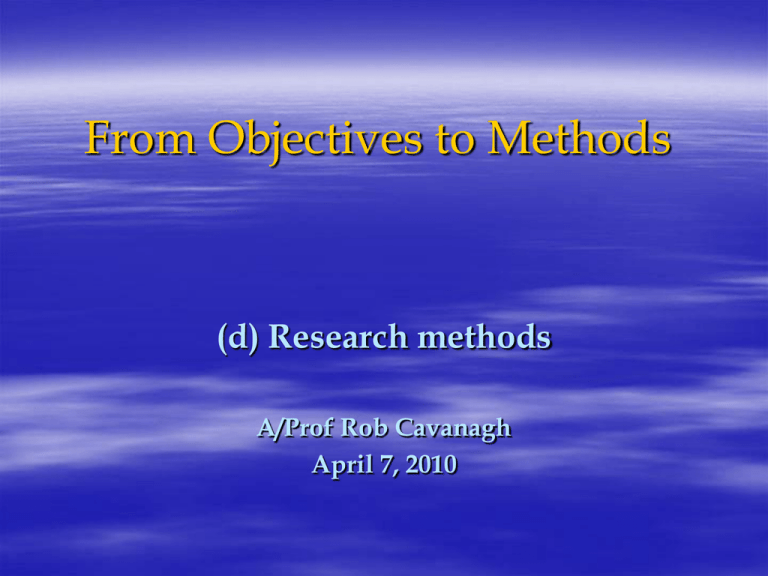
From Objectives to Methods (d) Research methods A/Prof Rob Cavanagh April 7, 2010 Methodology and Ontology Researchers often ground their study on an ontological stance – their view of their world There is a nexus between their ontology and the methodology they choose to apply Their view of their world – their ontology - is ideally explained in the Methodology section of the research proposal Methodology and Methods A ‘methodology’ is a combination of research techniques or ‘methods’ For example: Ethnography The methodology of ethnographic research: A variety of approaches are applied to in an attempt to gain an holistic as possible ‘picture’ of a particular society, group, institution, setting or situation The methods of ethnographic research: In-depth interviewing Participant observation Keeping field notes (field jottings, diary & log) Methods are Actions Methods propel one toward something or to do a thing A method is like a cooking recipe A method is something that is simply ‘followed’ A method is a series of directions that pre-suppose we already know what we want Methodological Assumptions Initial precision in research design is essential OR The initial ambiguity that occurs in a study is desirable Precise hypotheses should be stated at the outset OR Hypotheses emerge as data/information is gathered Precise unequivocal definitions should be stated at the outset OR Definitions should emerge as data/information is gathered Methodological Assumptions cont’d Assessment of validity requires statistical examination of numerical data OR Validity is best evidenced by cross-checking of information from different sources or obtained by different methods – triangulation Precise explication of the procedures applied in the research must precede data collection OR A narrative/ literary description of procedures should be compiled as the research proceeds Writing the Methodology Section The readers of your research proposal will have different backgrounds and come from different traditions of research These readers will be greatly assisted by the Methodology situating the research methods within: A particular research approach – a ‘tradition’ of research An acknowledged ‘research methodology’ A particular ‘research design’ Organising Presenting the Research Procedures This will depend on the overall approach being employed For example: If the research is to proceed through a series of sequential stages or phases, the temporal sequence of stages can provide an overall structure (Phase One, Phase Two etc) When the empirical investigation is more holistic or integrated, an alternative structure is required (no distinct phases) A Common Template There are usually aspects of the research methods which are common to all approaches and these can provide a template for the writing after the ontological foundation of the methodology is explained Either within each phase if the research is to proceed through separate stages OR For the entire empirical investigation if it is holistic Four Elements in the Template 1. The setting and participants 2. How information or data is to be collected 3. How information or data will be interpreted or analysed 4. Quality control procedures 1. The Setting and Participants The setting: Geographical location The culture Why the setting was chosen The participants: Attributes of the participants How many, why they were chosen, and how they were chosen In positivistic research The nature of the population, the sample, and sample selection techniques 2. Data collection Describe the methods, perhaps instrumentation, used to obtain information. For example: Observing – checklist, participant/non-participant, videotaping etc Interviewing – structured, semi-structured, unstructured, face-to-face, email, telephone etc Surveying – open-ended, rating scales, self-reported etc Archival retrieval – diaries, newspaper articles etc 3. Data analysis Describe how information or data that is to be collected will be interpreted or analysed For example: Discourse analysis Textual analysis – classification, coding, emergent themes Statistical analyses – descriptive stats, exploratory techniques, testing hypotheses etc 4. Quality Control Procedures Describe the procedures or techniques that will be applied to make sure the findings of the study are a truthful or accurate representation of the phenomenon studied For example, by: Triangulation of data and/or methods Ensuring content validity, internal validity, or internal reliability Methodology and Research Questions The Methodology describes the ‘means’ through which the ‘end’ of achieving the research objectives is to be facilitated There needs to be an overt connection between the Research Objectives/Research Questions and the Methodology There may well be issues that arise in writing the Methodology that require reconsidering the feasibility of the original research questions and then modifying these Focus on Research Methods only A well-written Methodology will not include material that more properly should be presented in other sections of the research proposal Particularly: Stating what the research seeks to achieve (Research Objectives) Overtly connecting with the prevailing knowledge (Background) Identifying why the research will be important for others (Significance) Proposal Writing versus Thesis Writing In a proposal the Methodology is written in the future tense – it explains what will be done and why it should be done In a project report or thesis, the Methodology is written in the past tense – it explains what was done why it was done Final reminder The choice of research methods needs to be justified in terms of the expectation of providing data/information to enable the research objectives to be attained So, overall, make sure you don’t: Pose research questions that can’t be answered by the results of applying the Methodology Propose collection and analysis of data that are not directly related to the Research Questions Scientific Human Research Eidos Guiding principle Abstract ideal Design check Rationality Cohesion Fidelity Conception Boundaries Components Tools Instruments Analyses Operational definition Dimensions Constructs Methodology Data collection Data analysis Questions Associations Influences Approach View of the world View of knowledge
